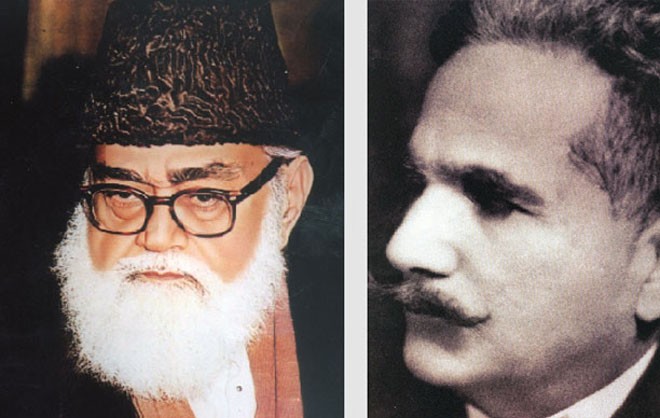
Lending Islamic intent to our national narrative

Intellectual history has acquired a kind of centrality in current academic circles, and certain ideas and concepts, such as the ‘event’ and ‘personality’ have come to hold precedence over the usual categories of historical analysis.
This, however, does not imply that the event or personality is discounted from the epistemic equation altogether. The central premise of that sub-discipline is that ideas do not germinate and evolve in isolation from people who create and deploy them; therefore, these must not be studied as abstract propositions but in terms of culture, lives and historical contexts that produce them.
In other terms, studying the process of how ideas are formed, transformed and mutated either because of the change in context or convergence with other ideologies etc. is the thematic scope of intellectual history. Thus, context is extremely important for proper appreciation of ideas -- and so is the way ideas are expressed in texts.
In such a context, Western academics who engage with intellectual history focus on two Muslim thinkers -- Allama Muhammad Iqbal and Maulana Abu A’la Maududi.
Javed Majeed’s book Muhammad Iqbal: Islam, Aesthetics and Post Colonialism has virtually become a benchmark for scholars engaged in Iqbal studies around the globe. Similarly Jan-Peter Hartung’s study on Maududi, A System of Life: Maududi and the Ideologisation of Islam is undoubtedly an important intervention in the existing body of knowledge on political Islam. Both the thinkers are particularly important in ascribing ideological connotation to Pakistani nationalism.
Their message(s) resonate in the subcontinent, particularly Pakistan, but far beyond it. Iqbal’s poems are compulsory in Iran and his importance as a Muslim thinker is rising. Iqbal has a partial relevance even in India.
Correspondingly, Maududi has been re-discovered by Western academia along with Sayyid Qutb and Hassan al-Banna in the wake of 9/11. Currently, he is seen as a pan-Islamic thinker whose influence has gone beyond the geographical confines of the subcontinent. Here, we will reflect on the two thinkers with reference to their impact on Pakistani nationalism and on them attributing a definitive religious slant to it.
One may argue that after the secession of East Pakistan both of them attained an overriding importance in the construction of Pakistan’s national narrative.
Interestingly, a few decades later, and particularly late 1980s onwards and more so after the establishment of the Talban rule in Afghanistan in mid-1990s, the seminary Mullahs appropriated Islam as the central postulate of state ideology. And, in this era of Talban ascendancy -- TTP, Lashkar-i-Jhangvi, Jundullah and Ahrar ul Hind etc -- the messages of the two protagonists, Iqbal and Maududi, have steadily been shoved to the backseat.
Biographical accounts of the two reveal that they did not attend any religious seminary. This was probably the reason that strong doubts were cast by the typical ulema, particularly about their authority as scholars and spokespersons of Islam. Iqbal went to modern institutions like Cambridge and Munich Universities and adopted and adapted modern Western thoughts in his poetry as well as prose. Despite being trenchantly critical of the West, he was receptive to the intellectual currents flowing from the occident.
I wonder if Iqbal can ever be understood without any serious engagement with contemporary epistemic trends in the West. What he did was indeed perceptive. The convergence of Western ideas with Islamic thought, derived primarily from Quran and Masnavi-i-Ma’navi by Rumi, was an extraordinary creative venture of Iqbal. It made his philosophical insights a fascinating subject of study.
Iqbal’s thoughts and poetics continue to fascinate even after 77 years of his demise. Yet Iqbal is the main steering force of Pakistani nationalism, despite the fact that he passed away almost nine years before the creation of Pakistan.
Though widely different from Iqbal, Maulana Maududi shared some commonalities with him. Unlike Iqbal, Maududi was self-taught with a background in Urdu journalism. He had been an editor of Al-Jamiat in the 1920s. Writing effective and lucid prose was his forte. The phenomenonal success of his Quranic exegesis, Tafheem ul Quran, was largely because of the uniqueness of his writing style.
Maududi was a prolific writer with ideas steeped in modernity: his support for nation state, constitution and democratic dispensation indicate that he was a modern-age thinker.
Both Maududi and Iqbal lent Islamic intent to Pakistani nationalism. Iqbal’s Urdu poetry became instrumental in serving the cause of the Islamists which was extensively used to prove that Pakistan was essentially meant to be an Islamic state. In the 1970s and 1980s, ulema like Dr. Israr Ahmed appropriated Iqbal for propagating their extremist version of Islam as a state ideology.
The point worth noting here is that Iqbal’s message was used for setting the tone for seminary-trained mullahs (largely of Deobandi persuasion) to claim ownership of Pakistan. Maududi was not only an exponent of the idea of an Islamic state but on several occasions joined hands with these mullahs from seminaries.
In the current discourse punctuated with horrifying spectacles of killings and bloodshed, Iqbal’s Urdu poetry recited by the clerics like Israr Ahmed or Maududi’s thoughtful and lucid writings appear extremely modest and soft. It is, however, quite interesting that both these thinkers are under critical scrutiny in the Western academia. As the subject(s) of intellectual historians and social scientists, both of them are being studied through different prisms and in multiple contexts. It will certainly provide us with a fresh perspective of both these thinkers.